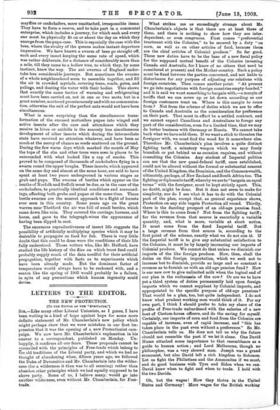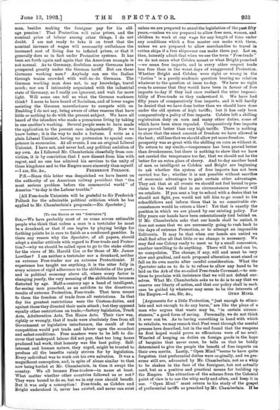LETTERS TO THE EDITOR.
THE NEW PROTECTION.
[To THE EDITOR OP THE "SPECTATOR."]
Sia,—Like many other Liberal Unionists, as I guess, I have been waiting in a kind of hope against hope for some more definite statement of Mr. Chamberlain's new policy which might perhaps show that we were mistaken in our first im- pression that it was the opening of a new Protectionist cam- paign. We now have Mr. Chamberlain's explanation in his answer to a correspondent, published on Monday. Un- happily, it confirms all our fears. These proposals cannot be reconciled with the principles of Free-trade which belong to the old traditions of the Liberal party, and which we had no thought of abandoning when, fifteen years ago, we followed the Duke of Devonshire and Mr. Chamberlain into the wilder- ness (for a wilderness it then was to all seeming) rather than abandon other principles which we had equally supposed to be above party. Some of us, I believe many, would go into another wilderness, even without Mr. Chamberlain, for Free- trade. What strikes me as exceedingly strange about Mr. Chamberlain's objects is that there are at least three of them, and there is nothing to show how they are inter. dependent, or even congruous. First comes " preferential treatment with the Colonies," to be secured by a duty " on corn, as well as on other articles of food, because these are the chief articles of Colonial produce." So far good. These new duties have to be the base of a new fiscal policy for the supposed mutual benefit of the Colonies (meaning Canada and Australia, for I know of no others that need be considered at present) and the Mother-country. Such a policy must be fixed between the parties concerned, and not liable to disturbance for any purpose of adjusting our relations with foreign countries. Then comes another point. " At present we go into negotiations with foreign countries empty-handed," and it is said we want something to bargain with,—a margin of tariffs that we can screw up or let down according as our foreign customers treat us. Where is this margin to come from ? Not from the scheme of duties which we are to offer to Canada and Australia as the consideration for preference on their part. That must in effect be a settled contract, and
we cannot expect Canadians and Australians to forego any part of the consideration, even for a limited time, that we may do better business with Germany or Russia. We cannot take back what we have sold them. If we want a stick to threaten the foreigner with, we must find the wood for it somewhere else. Therefore Mr. Chamberlain's plan involves a quite distinct fighting tariff, a minatory weapon which we may freely brandish or put behind us as occasion requires, and without consulting the Colonies. Any student of Imperial politics can see that the new quasi-federal tariff, once established, could not be altered without the formal or substantial consent of the United Kingdom, the Dominion, and the Commonwealth, ultimately, perhaps, of New Zealand and South Africa too. The fighting or diplomatic tariff, whereby we are to " bargain on equal terms " with the foreigner, must be kept strictly apart. This, no doubt, might be done. But it does not seem to make for simplicity, nor do I see what it has to do with the Colonial part of the plan, except that, as general experience shows, Protection on any side begets Protection all round. Thirdly, there is the dazzling prospect of an old-age pension fund. Where is this to come from ? Not from the fighting tariff ; for the revenue from that source is essentially a variable quantity, and, what is more, variable at short notice. It must come from the fixed Imperial tariff. But a large revenue from that source is, according to the first point of the scheme, exactly what we do not aim at. If the Imperial tariff is to give any substantial satisfaction to the Colonies, it must be by largely increasing our imports of Colonial produce. We cannot do that unless we diminish our imports of the like foreign produce. How, then, shall the duties on this foreign importation, which we seek not to increase but to diminish, provide so large and so constant a revenue as to furnish us with an old-age pension fund ? How is our new cow to give unlimited milk when the logical end of our plan is the euthanasia of the cow P Or are we to have yet a third system of duties permanently laid upon foreign imports which we cannot supplant by Colonial imports, and appropriated to the specific purpose of old-age pensions ? That would be a plan, too, but quite independent. I do not know what prudent working men would think of it. For my own part, I think I should prefer to take my share of the profits of Free-trade unburdened with the salaries of a new host of Custom-house officers, and do the saving for myself. Certainly, our imports of corn and food from the Colonies are capable of increase, even of rapid increase, and " this has taken place in the past even without a preference." So Mr. Chamberlain tells us. He does not tell us why the future should not resemble the past if we let it alone. One David Hume attached some importance to that resemblance as a guide to human action ; and Lord Melbourne, though no philosopher, was a very shrewd man. Joseph was a grand economist, but also David left a rich kingdom to Solomon. Let us fight the Philistines and the Ammonites if we must, and do good business with Tyre and Sidon when we can. David knew when to fight and when to trade. I hold with the two Davids.
Oh, but the wages ! How they thrive in the United States and Germany! More wages for the British working
man, besides making the foreigner pay for his old- age pension ! That Protection will raise prices, and the nominal price of labour among other things, I do not doubt. I. am not ready to take it on trust that the nominal increase of wages will necessarily outbalance the increased cost of living due to inflated prices, or that it generally does so in fact under Protective systems. It has been set forth again and again that the American example is not normal. As to Germany, doubtless many Germans have prospered greatly under the German tariff. But are those Germans working men ? Anybody can see the Italian through trains crowded with well- to- do Germans. The German working man does not, to my knowledge, travel much ; nor am I intimately acquainted with the industrial state of Germany, so I really am ignorant, and wait for more light. Will some one tell us what the German workmen think? I seem to have beard of Socialism, and of lower wages assisting the German manufacturer• to compete with us. Enabling I do not say, being aware of other reasons that have little or nothing to do with the present subject. We have all heard of the islanders who made a precarious living by taking in one another's washing. Several people seem to have made the application to the present case independently. Now we know better; it is the way to make a fortune. I write as a plain Liberal Unionist, having no pretension to special com- petence in economics. At all events, I am an original Liberal Unionist. I have not, and never had, any political ambition of my own. As I followed Mr. Chamberlain cheerfully from con- viction, it is by conviction that I now dissent from him with regret, and no one has admired his services to the unity of these kingdoms and to the Empire more sincerely than myself.
—I am, Sir, &c., FREDERICK POLLOCK.
P.S.—Since this letter was despatched we have learnt on the authority of an American railway president that " the most serious problem before the commercial world " of America " to-day is the Labour trouble."
[All Free-trade Unionists will be grateful to Sir Frederick • Pollock for the admirable political criticism which he has applied to Mr. Chamberlain's proposals.—ED. Spectator.]











































 Previous page
Previous page